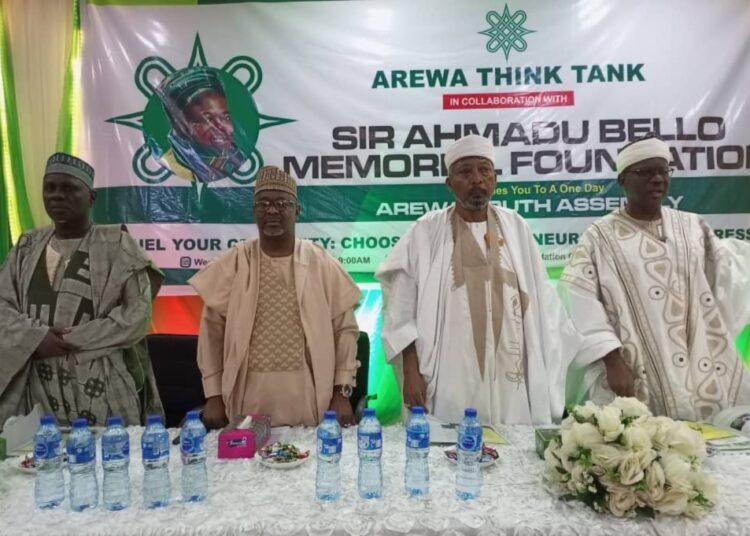Rising from a one-day stakeholders’ roundtable organised by the Arewa House, Centre for Research and Historical Documentation, Kaduna, the stakeholders have urged government representatives, civil society organisations and citizens to engage in open and inclusive dialogue to address the underlying issues and concerns that may drive protests.
This formed part of the communique issued at the end of the discussions with the theme: “Alternative Paths to Peaceful Co-existence and Sustainable Development in Nigeria” on Thursday in Kaduna.
Participants to the gathering were drawn from religious leaders, youth groups, traditional leaders, opinion influencers, trade unions, academicians, security agencies, representative of government agencies and those of student the unions.
At the end of the discussion, Director of Arewa House, Professor Shuaibu Shehu Aliyu, in a communique, said the need for dialogue in place of protests cannot be over emphasised, as participants urged all concerned parties to embrace dialogue.
In yet another one-day conference of Arewa Youth Assembly and the Arewa Think Tank in collaboration with Sir Ahmadu Bello Memorial Foundation (SABMF), the groups decided to back out of the proposed nationwide protest against the government of President Bola Tinubu over socio-economic hardship in the country.
A communique presented at the end of the meeting by the Convener of Arewa Think Tank, Muhammad Alhaji Yakubu, noted that the conference theme, “Fuel Your Creativity: Choosing Entrepreneurship for Progress”, resonated well with the Northern youths and held significant potential for the benefit of the entire country.
The groups strongly denounce protests under any guise, saying they are counterproductive and can lead to violence, loss of lives, and destruction of properties.
“Therefore we have resolved that we will not be part of any protests. We call on Nigerian youth to engage authorities constructively through peaceful and legal means, such as dialogue and constructive engagement,” Yakubu said.
For its part, the Arewa Youth Assembly said it remained steadfast in its commitment to fostering entrepreneurship, advocating for youth development, and promoting peace and progress in the nation.
“We call on all stakeholders, including the government, civil society, and the private sector, to join hands with us in achieving these goals
Similarly, the Coalition of Concerned Citizens of Kaduna State has equally opposed “any maliciously stage-managed protests“ in the state.
Addressing a press conference, the Convener of the group, Comrade Ali Sanji Mohammed and Director of Gender, Asmau Mohammed averred that the Kaduna State Governor, Sen. Uba Sani has continued to create necessary interventions to improve human capital development in the state, especially in the neglected rural areas.
The Arewa Stakeholders’ communique acknowledged the prevailing social circumstances in Nigeria, where socio-economic challenges, including hyperinflation, unemployment, and resource scarcity which have heightened tensions within the communities.
It however noted that as “significant segments of the Nigerian population are preparing for the anticipated nationwide protests scheduled for August 2024, it has raised considerable concern among many regarding the potential for unrest to exacerbate these existing challenges, leading to unintended consequences for our society.”
It further noted that after extensive deliberations, the roundtable came up with possible means seeking to address the potential negative impacts of civil unrest while affirming the fundamental rights of individuals to express their grievances peacefully.
“Having carefully considered the experiences and lessons learned from similar protests around the world, including the crises in Sudan, Yemen, Syria, Venezuela, Hong Kong, and Myanmar, we acknowledge the devastating consequences that prolonged conflicts and humanitarian crises can have on the lives and well-being of our citizens.
“We are equally aware of the societal disruptions that can arise from protests that escalate into violence and unrest. The experiences of these nations illustrate how civil strife can lead to loss of life, widespread displacement, economic decline, and the erosion of social cohesion,” it noted.
The communique expressed understanding on the grievances that may drive individuals and groups to take to the streets in protest, it however believes that it is crucial to seek alternative paths to address these issues as paths that prioritize peaceful coexistence, dialogue, and sustainable development.
“We firmly believe that engaging in constructive dialogue and collaborative efforts can lead to more effective and lasting solutions to the challenges facing our nation,” the group said.
It also urged the Federal and State Governments to urgently implement programmes aimed at addressing the root causes of public discontent, such as unemployment, poverty, and lack of social services.
“The government should also, as a matter of urgency, release all those arrested in connection with the proposed protests. Doing so would earn the government respect and may help to diminish the momentum of the protesters.
“We call upon the government and relevant stakeholders to explore alternative avenues, such as town hall meetings, public consultations, and policy reforms, to address the grievances and demands of the citizens, and recognition of the importance of youth in shaping the future of our nation, we propose the implementation of youth empowerment programmes that provide gainful employment, skills training, and opportunities for youth to actively participate in the development of our society,” the communique read.
Stakeholder also emphasised the need to strengthen institutions, including the judiciary, security agencies, and governance structures to guarantee accountability, transparency, and justice for all citizens.
It also appealed to religious and community leaders to guide their congregations in prayers for peace and prosperity, and counsel their followers on the importance of peaceful coexistence.
“We also encourage affluent members of society to provide assistance in alleviating the suffering of the less privileged through the provision of food, medicines, and other necessities,” the group said.











